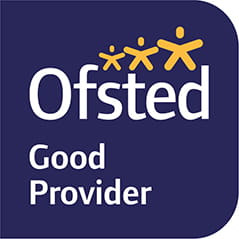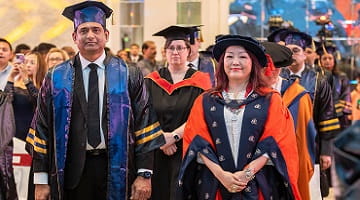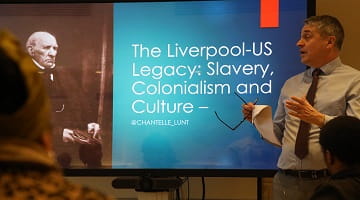2024/25 entry
PGCE Primary Teaching with QTS (salaried)
About this course
Become a superb Primary teacher at LJMU. Graduate with a Postgraduate Certificate in Education (PGCE) and Qualified Teacher Status (QTS) for the 3-7 or 5-11 age range.
- Earn whilst you learn on this employment-based initial teacher training programme
- Train to teach whilst an employee in a school setting and take on responsibility for your own classes from the first day of term
- Follow a curriculum developed and delivered in partnership with outstanding local schools
- Learn from LJMU staff at our city centre campus and from expert teachers
- Prepare for a career as an innovative and creative teacher
The Salaried School-led programme is an employment based route which leads to a PGCE with Qualified Teacher Status at Primary level. It is offered by Lead Partners in collaboration with LJMU.
As a Salaried student teacher, you will be employed in a school while you train and will receive a salary from your school (the amount paid is linked to the unqualified teacher pay scale which may be enhanced by schools for some subject areas). The school will also cover the cost of your training to become a qualified teacher.
Our philosophy of 3-7 teaching centres around a commitment to learning and teaching through play and interaction. This is a challenging and rigorous approach, which requires high level planning, organisation, intervention and assessment.
Training to teach the 5-11 age range enables you to explore pedagogical approaches to teaching and learning across all national curriculum subjects with a particular focus on the core subjects, including the teaching of phonics. You can also apply for 5-11 with a specialism in mathematics or PE.
This programme is usually open to graduates with three years' work experience. Schools can, however, choose to accept applications from candidates with less work experience to attract high-quality applicants. This route is ideal if you are considering a career change, but you must apply with a school willing to support you and to employ you whilst you train. If you are interested in the Salaried School-led route, please contact the Lead Partner school to discuss your application, before you apply.
Salaried School-led pathways are only offered by some school consortia. You can find out where it is available by searching the Government's teacher training course search website
Each consortium has a Lead Partner, which works in partnership with LJMU to develop their training programme. While all of the training is based on a framework agreed with the University, each School-Led programme is distinctive and you are advised to check full details of training and requirements on the Lead Partners web pages and get in touch with them before applying.
Applications for salaried School-led places for Primary teaching are made directly to Lead Partners via DfE Apply: Apply for teacher training - GOV.UK (www.gov.uk). The interview and selection process is conducted by school staff in association with LJMU.
Our Initial Teacher Training programmes support the development of your: critical understanding of educational theory and practice; reflective practice linked to professional development and practitioner research skills for effective teaching and learning. They also enhance your understanding and the application of your subject knowledge.
Courses can be viewed on the government's Get into Teaching website.
Professional body recognition
Our Initial Teacher Education courses are monitored by Ofsted - the Office for Standards in Education.
In June 2023, Primary Initial Teacher Training received a “good” rating following a rigorous 4-day inspection. Ofsted noted many strengths in provision, which are noted below.
Leaders have worked with great care and attention in designing their ITE curriculum. They have thought carefully about how to embed the DfE’s core content framework into each of the primary-phase programmes. Leaders work closely and effectively with partner schools to decide what trainees should learn in the centre- and school-based training. Across all Primary programmes, leaders use experts from schools to help to teach student teachers.
Primary student teachers develop a confident, well-informed understanding of early reading, including of Systematic Synthetic Phonics. Tutors provide guidance on how to select and use a rich range of literature to inspire pupils about reading, such as stories written by authors from diverse backgrounds. Student teachers fully understand how to build on children’s early communication and language development.
The primary-phase ITE programmes are taught by expert tutors and trainers. Leaders make sure that their staff actively participate in the work of national organisations and subject networks. Students value the input given to them by tutors and trainers about pertinent education research that will help them in their careers.

Fees and funding
There are many ways to fund postgraduate study for home and international students
Fees
The fees quoted at the top of this page cover registration, tuition, supervision, assessment and examinations as well as:
- library membership with access to printed, multimedia and digital resources
- access to programme-appropriate software
- library and student IT support
- free on-campus wifi via eduroam
Additional costs
Although not all of the following are compulsory/relevant, you should keep in mind the costs of:
- accommodation and living expenditure
- books (should you wish to have your own copies)
- printing, photocopying and stationery
- PC/laptop (should you prefer to purchase your own for independent study and online learning activities)
- mobile phone/tablet (to access online services)
- field trips (travel and activity costs)
- placements (travel expenses and living costs)
- student visas (international students only)
- study abroad opportunities (travel costs, accommodation, visas and immunisations)
- academic conferences (travel costs)
- professional-body membership
- graduation (gown hire etc)
Funding
There are many ways to fund postgraduate study for home and international students. From loans to International Scholarships and subject-specific funding, you’ll find all of the information you need on our specialist postgraduate funding pages.
Please be aware that the UK’s departure from the EU may affect your tuition fees. Learn more about your fee status and which tuition fees are relevant to you.
As you are employed while training, you will not be eligible for a training bursary or student finance.
Tuition fees will be paid by your employing school.
Employability
Further your career prospects
LJMU has an excellent employability record with 96% (HESA 2018) of our postgraduates in work or further study six months after graduation. Our applied learning techniques and strong industry connections ensure our students are fully prepared for the workplace on graduation and understand how to apply their knowledge in a real world context.
During your training there will be ample opportunities for engagement with relevant local employment organisations including schools and teacher recruitment agencies through on campus events.
You will be encouraged to join the relevant professional association for your subject or area of study, providing the opportunity to engage with wider networks of teachers and others interested in your chosen area.
Most of our students go on to work in schools and colleges, locally and nationally, in the state or independent sectors.
Teaching provides a variety of career pathways leading to specialist roles in schools and colleges ranging from pastoral care and subject leadership right through to school leadership positions.
Having gained experience in teaching, a number of graduates move into associated professions such as educational psychology, consultancy, and roles in the education service sector outside of schools.
The student experience
Discover life as a postgraduate student at LJMU.
News and views
Browse through the latest stories and updates from the University and beyond
Course modules
Discover the building blocks of your programme
Your programme is made up of a number of core modules which are part of the course framework. Some programmes also have optional modules that can be selected to enhance your learning in certain areas and many feature a dissertation, extended report or research project to demonstrate your advanced learning.
Core modules
Reflecting on Teaching and Learning
40 credits
This module is designed to enable student teachers to systematically develop, demonstrate and critically reflect on evidence of competence across all areas of the LJMU ITE Curriculum to ensure that the Teachers’ Standards are met at the end of the programme and Qualified Teacher Status (QTS) can be awarded.
This module focuses on the teaching placement (minimum 120 days) in a Home School and Alternative Placement. Students plan and evaluate their school-based practice and are supported by mentors and tutors who assess their progress against the LJMU ITE Curriculum. To pass the module and meet the competency requirements, student teachers must pass the placement experience and triangulation process. Student teachers must also complete a Early Career Profile (ECP) outlining targets for early career development.
Optional Modules
Becoming a Professional Teacher
20 credits
The aim of this module is to develop student teachers' understanding of both subject-specific and general pedagogies, and to develop competent and knowledgeable teachers with an understanding of learning, teaching and assessment.
Students will reflect on theoretical and practical understanding of subject and / or phase teaching, including subject knowledge and teaching approaches. Taught sessions will include curriculum models and delivery, early mathematics, early reading and writing, classroom management (inc. behaviour) and effective teaching methods. Pedagogical approaches will focus on the teaching of core and foundation subjects, including teacher explanations, modelling, questioning and dialogue, group, adapting teaching and independent learning including stretch and challenge, etc. Students will also learn how to effectively assess and record progress, including both formative and summative methods of assessment.
Education and Schooling
20 credits
This module provides an option to complete a postgraduate Initial Teacher Education (ITE) programme with an alternative exit award WITHOUT recommendation for Qualified Teacher Status (QTS). In this module, students will develop a critical understanding of the contemporary policy landscape of education and schooling in England, with reference to educational research and scholarship, informed by personal observation of practice.
Pathways to QTS
- Primary Key Stage 1/2 (5-11 years) with QTS
- Primary Foundation Stage/Key Stage 1 (3-7 years) with QTS
- Primary with Mathematics Specialism (5-11 years) with QTS
- Primary with Physical Education Specialism (5-11 years) with QTS
Teaching
An insight into teaching on your course
Study hours
University-based study includes:
- a full-time block of one week midway through your course
- 8 half-day taught sessions.
You will undertake a significant amount of independent study and preparation to support your course assignments and school-based work.
The majority of your training will take place in your employing school.
Teaching methods
You will learn via lectures, seminars, interactive workshops, group discussion and reflection, problem solving and micro-teaching. You will also make use of our online learning environment.
You will be allocated a Teacher Mentor who will organise and supervise your school-based training. Your Mentor will be supported by your LJMU Liaison Tutor who will visit your school several times to monitor your progress. Additional professional development sessions are organised in school during placements.
Tutorial support is an important part of the LJMU learning process and you will receive a personalised service that will enable you to set targets and achieve your potential. Your Personal Tutor will support your academic and professional development and will meet with you formally during the year.
Applied learning
You will spend at least 120 days on teaching placement in school in addition to your school-led training.
The vast majority of your teaching experience will take place in a 'Home School' with the exception of an additional two-week placement in an 'alternate' school during your training.
School-based training involves the preparation and delivery of learning sequences and lessons to small groups and whole classes of learners, with expectations and workload increasing during the course. This work is supported by a Teacher-Mentor who will enhance your professional learning experience in school.
Assessment
How learning is monitored on your programme
To cater for the wide-ranging content of our courses and the varied learning preferences of our students, we offer a range of assessment methods on each programme.
Assessment methods include: critical reflections on research and practice, small scale research projects, the design and analysis of learning experiences, presentations and a portfolio of professional activities.
You will need to monitor your progression towards achieving the professional standards required for Qualified Teacher Status (QTS) and maintain a professional development portfolio.
A final assessment of your achievement of the Teachers’ Standards required will be based on co-observation and assessment of your teaching practice, with your mentor and tutor, and the evidence of pupils’ learning and progress in the classes that you teach.
Course tutors
Our staff are committed to the highest standards of teaching and learning
Dr Heather Hatton
Salaried Programme Lead
Heather Hatton is a Senior Lecturer in Initial Teacher Education, leading the Secondary History and Salaried Teacher Training programmes. She moved into Initial Teacher Education in 2019 and joined LJMU in 2022. Prior to this, Heather worked as a secondary history teacher in Derbyshire and completed her PhD in History in 2021. Her research interests include secondary history teaching, and Early American Studies.
-
 Lecturer/Senior Lecturer
Lecturer/Senior Lecturer -
 Lecturer/Senior Lecturer
Lecturer/Senior Lecturer -
 Lecturer/Senior Lecturer
Lecturer/Senior Lecturer
School facilities
What you can expect from your School
You will have access to all of the classroom and teaching facilities provided by your employing school as well as the expertise of educational professionals at LJMU.
Based in Mount Pleasant campus in the dedicated Education Building, the School of Education benefits from independent study spaces with IT facilities, a cafeteria and shop, close proximity to Aldham Robarts Library and access to student welfare and support. In addition to these facilities, you will find high quality meeting and seminar rooms and lecture theatres.
Entry requirements
You will need:
Qualification requirements
Undergraduate degree
- a minimum 2:2 honours degree (or recognised equivalent)
GCSEs and equivalents
- GCSE English Language, Mathematics and Science at grade 4/C (or above) or equivalent qualifications – level 2 numeracy and literacy are not acceptable
-
GCSE equivalency tests are accepted in English, Language, Maths and Science, but ONLY if results are officially received and can be verified PRIOR to application
-
We will not consider candidates with pending GCSEs or equivalency tests
International requirements
-
IELTS
- IELTS score 7.0 (Minimum 6.5 in each component) - achieved prior to application
Further information
-
Extra Requirements
- a demonstrable interest in and enthusiasm for teaching within the primary age range. You could show this in a number of ways – time spent in schools, knowledge of the curriculum, relevant practical experience
- Receipt of satisfactory Disclosure Barring Service (DBS) Certificate prior to enrolment
-
Completion of a medical questionnaire, for medical clearance by the LJMU Occupational Health team, to confirm Fitness to Teach.
If an applicant needs to improve their subject knowledge, they may be asked to complete a subject knowledge enhancement (SKE) course.
-
RPL
RPL is not accepted on this programme
Application and selection
Securing your place at LJMU
If you want to join a PGCE with us, you will need to apply through the Apply for Teacher Training service here https://www.gov.uk/apply-for-teacher-training
Applications can be made via Apply to the Lead Partner. Each applicant will be considered in consultation with an LJMU Admissions Tutor and may be asked to attend a selection event in school. The selection process will be led by the schools' Teachers and Senior Leaders and may involve LJMU Tutors.
Ability
Applicants will be assessed for their:
- depth of relevant subject knowledge
- potential to work effectively at Masters level
- ability to work with others in teams
- ability to manage people and projects
Attitude
Applicants will be expected to demonstrate:
- an interest and enthusiasm for their chosen subject area
- an ability to make learning exciting and meaningful to young people in a range of contexts
- commitment to supporting learners in areas of challenging social context
- enthusiasm and resilience
Courses can be viewed on the government's Get into Teaching website.
Location
You should live within reasonable travelling distance of the University and our partner schools for the duration of the course.
Selection events
Selection is based on performance in an interview, teaching and written tasks and may involve the school's learners. The selection process will be led by the schools' Teachers and Senior Leaders and may also involve LJMU Tutors.
Your performance in each part of the selection process is graded and a final decision is made on your performance across the day. Full details of the interview process will be sent to you in advance of the selection event.
Prior to entry
You will need to meet the Department for Education's standards for physical and mental fitness to teach and clearance to work with children. Further information, including a Declaration of Health questionnaire and details of how to apply for a Disclosure and Barring Service (DBS) Enhanced Disclosure, will be sent to you after you have firmly accepted an offer."
The University reserves the right to withdraw or make alterations to a course and facilities if necessary; this may be because such changes are deemed to be beneficial to students, are minor in nature and unlikely to impact negatively upon students or become necessary due to circumstances beyond the control of the University. Where this does happen, the University operates a policy of consultation, advice and support to all enrolled students affected by the proposed change to their course or module.










